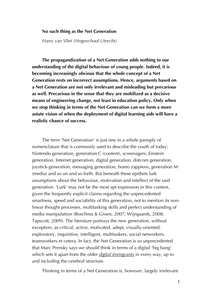The propagandization of a Net Generation adds nothing to our understanding of the digital behaviour of young people. Indeed, it is becoming increasingly obvious that the whole concept of a Net Generation rests on incorrect assumptions. Hence, arguments based on a Net Generation are not only irrelevant and misleading but precarious as well. Precarious in the sense that they are mobilized as a decisive means of engineering change, not least in education policy. Only when we stop thinking in terms of the Net Generation can we form a more astute vision of when the deployment of digital learning aids will have a realistic chance of success.
DOCUMENT

There is a growing interest in the use of simulations and games in Dutch higher education. This development is based on the perception that students belong to the 'gamer generation' or 'net generation': a generation that has grown up with computer games and other technology affecting their preferred learning styles, social interaction patterns and technology use generally. It is often argued that in education this generation prefers active, collaborative and technology-rich learning, i.e. learning methods that involve extensive computer use and collaboration among students. Gaming is then proposed as a new teaching method which addresses these requirements. This article presents the results of a survey which studied whether this discourse is also applicable to higher education students from the Netherlands and whether games, considered as active, collaborative and technology-rich learning experiences, are of greater importance in the formal education of today's students. Of 1432 respondents from eight Dutch institutes of higher education surveyed between 2005 and 2009, about 25% fit our criteria of being a clear representative of the net generation. Furthermore, our analysis shows that there is little difference, and no statistically significant difference, in active, collaborative and technology-rich learning preferences between the representatives and non-representatives of the net generation. Furthermore, no large or statistically significant differences were found between representatives and non-representatives of the net generation with respect to the value they accorded to gaming in education. Overall our dataset did not fit the expectations raised by the net generation theory, with the percentage of students who fit the criteria being much lower than expected. However, regardless of whether they represented the net generation or not, in general our respondents preferred collaborative and technology-rich learning and deemed games a valuable teaching method.
LINK
Er is al veel geschreven over de generatie die is opgegroeid met de vanzelfsprekende aanwezigheid van de moderne informatie- en communicatietechnologie en het internet als virtuele wereld, maar de consequenties voor het onderwijs worden nog onvoldoende onderkend. Het belangrijkste probleem is dat de generatie die onderzoek doet naar veranderend leergedrag behoort tot de digital immigrants, terwijl zij uitspraken doet over de generatie die behoort tot de digital natives (Prensky, 2006). De digital immigrants zien de informatie en communicatietechnologie als een aanvulling op reeds ontwikkelde routines, en dat betekent dat de mogelijkheden van die technologie ook vanuit dat perspectief worden beoordeeld. De routines van de digital natives zijn geworteld in deze technologie en werden erdoor gevormd.
DOCUMENT
